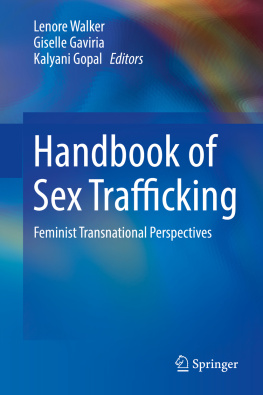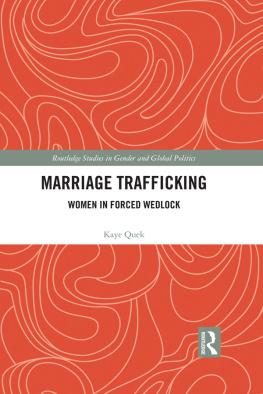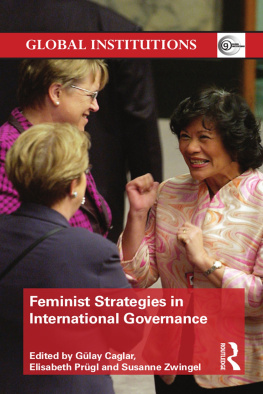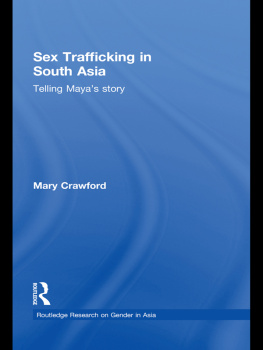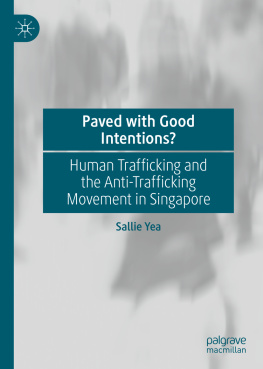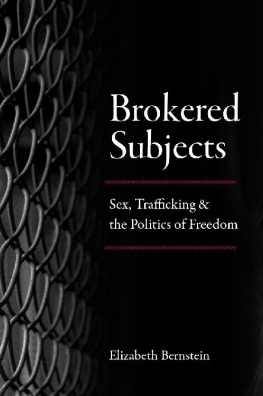The Politics of Trafficking
The First International Movement to Combat the Sexual Exploitation of Women
Stephanie A. Limoncelli
Stanford University Press
Stanford, California
2010 by the Board of Trustees of the Leland Stanford Junior University. All rights reserved.
No part of this book may be reproduced or transmitted in any form or by any means, electronic or mechanical, including photocopying and recording, or in any information storage or retrieval system without the prior written permission of Stanford University Press.
Printed in the United States of America on acid-free, archival-quality paper
Library of Congress Cataloging-in-Publication Data
Limoncelli, Stephanie A.
The politics of trafficking : the first international movement to combat the sexual exploitation of women / Stephanie A. Limoncelli.
p. cm.
Includes bibliographical references and index.
9780804774178
1. Human traffickingEuropePreventionHistory. 2. ProstitutionEuropeHistory. 3. WomenCrimes againstEuropePreventionHistory. 4. Social movementsEuropeHistory. I. Title.
HQ281.L55 2010
306.362dc22
2009029055
Typeset by Bruce Lundquist in 10/14 Minion
For my dad
Preface
WHEN I FIRST BECAME INTERESTED IN THE TOPIC OF TRAFFICKING , very little academic research had been done, and what research existed was dominated by an often vitriolic feminist debate over the normalization and legalization of prostitution. This literature often treated trafficking as a discursive construction or moral panic about prostitution, and drew broad conclusions about the repressive motivations of anti-trafficking reformers. Seeking to learn more about trafficking, I began to peruse the historical literature on prostitution, which, although small, provided a much richer, more complicated picture of the social organization of prostitution and the first anti-trafficking movement. It seemed important to me to situate trafficking for prostitution as a process intertwined with globalization and nation-state development, to look at the global and comparative reach of anti-trafficking activities, examining the rise of migratory prostitution, the development of the international anti-trafficking movement, and the specific implementation of anti-trafficking efforts within countries and empires.
Trafficking is now rapidly developing into a topic of widespread interdisciplinary interest, drawing scholars from law, political science, criminal justice, sociology, and womens studies. Although many of these scholars note the existence of the earlier anti-trafficking movement, historians have not yet fully documented it, and most scholars in other disciplines have overlooked the potential insights that an analysis of the movement could provide. Among other things, for sociologists, political scientists, and those interested in womens studies, a study of early anti-trafficking efforts could furnish information on the dynamics of international social movements and the origins of humanitarianism and human rights efforts; it could also offer possibilities for understanding the national and international politics of gender, race, class, and nationality. For legal scholars, it could not only supply a context for the origins of national and international anti-trafficking and prostitution law, but also offer lessons on how those laws were implemented and whether they worked as intended. Using primary data drawn from the archives of the League of Nations and the involved international voluntary associations, including uncatalogued material, this book provides a unique historical, ethnographic account of the first anti-trafficking movement that helps to illuminate all of the issues just listed, especially the role of gender and sexuality in international politics.
Acknowledgments
This project would not have gotten under way without assistance from a number of colleagues and friends. Gail Kligman discussed the project at length, read numerous drafts, provided sound scholarly and personal advice, and helped me to strengthen the contribution to the literature on gender and states and on trafficking. Michael Manns exemplary macro-level comparative-historical sociology greatly inspired me. I benefited enormously from his vast knowledge of European history and I appreciated his constructive feedback and good humor during our meetings. Ruth Milkman could always be counted on for her conceptual clarity and her support for comparative-historical work. Kathryn Norberg provided historical expertise on prostitution, extremely valuable comments, cheerful optimism, and ongoing encouragement.
Several organizations and programs generously provided funding for different aspects of the project. The German Marshall Fund of the United States and the UCLA Center for the Study of Women provided a fellowship that supported the initial research. The UCLA International Institute was helpful at two stages of the process: the Institutes Global Fellows Program provided a supportive place for interdisciplinary, transnational research during the data analysis stage, and its Center for European and Eurasian Studies provided support during the writing of the manuscript.
The librarians and staff at the Womens Library in London provided a home away from home in their beautifully renovated facility, often teasing me for my keen manner when I arrived promptly in the reading room each morning. The staff of the British Library of Political and Economic Science at the London School of Economics and Political Science were always prompt and professional, as were those at the British Library. Marianne Tsioli-Bodenmann at the University and Public Library at Geneva, now known as the Geneva Library, graciously let me sit among the stacks in the basement leafing through the uncatalogued boxes of material from the International Abolitionist Federations library. The staff kindly tolerated my daily presence in their workspace. Bernhardine Pejovic at the League of Nations archives in the library of the United Nations Office at Geneva was extremely helpful in locating League of Nations trafficking materials and answering questions, often while juggling the demands of several researchers, each speaking a different language. I also wish to thank the scholars I met in the archives and during my travelsCarole Moschetti, Karen Offen, Carole Pateman, and Jane Cowenwho provided friendly camaraderie along the way.
A number of people discussed the project with me, read various incarnations of chapters, or shared their valuable insights on particular aspects of the subject matter: Catherine Y. Lee, Peter Stamatov, David Cook-Martin, Sasha Milicevic, Bill Roy, Gabriela Fried, Stephen Legg, Andrew Abalahin, Leo Lucassen, Mara Loveman, Sidney Tarrow, and the faculty and visiting scholars that were part of the UCLA Global Fellows Program in 2004.
All of the staff at Stanford University Press have been wonderful, especially my editor, Kate Wahl. I have been impressed with their promptness, efficiency, and professionalism. I also wish to thank the reviewers for their thoughtful and constructive feedback on the manuscript, which has certainly helped to improve it.
My father, Fred Limoncelli, provided loving support that meant the world to me, as did my sisters, Stacy Moses and Anna-Maria Trimboli, and my mother and grandmother, Anna and Helen Koutouras. Tiffani Chin was unfailingly helpful, providing astute advice and friendship, as was Liana Grancea, with whom I spent much time at the UCLA International Institute. Liana also assisted me with translations of French material, for which I am grateful, and any errors are mine alone. Nona Glazer offered inspiration and empathy gained from her years of academic experience. My colleagues in the Department of Sociology at Loyola Marymount University, especially Nadia Kim and Anna Muraco, formed a great cheering section in the final revision stages of the manuscript. Finally, I wish to thank my family, Mark and Sophia, for everything.



